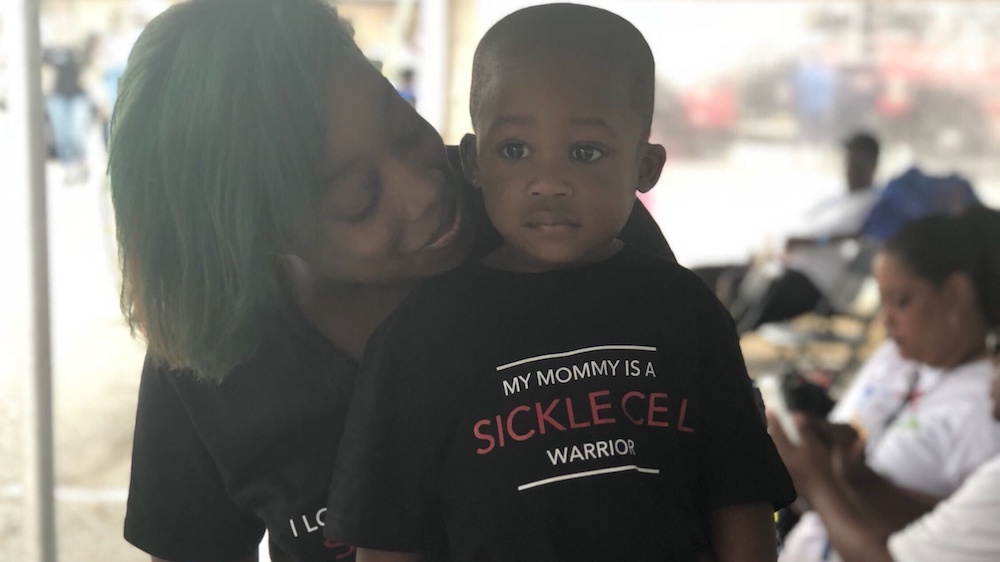If you’re interested in sharing your opinion on any cultural, political or personal topic, create an account here and check out our how-to post to learn more.
____
I haven’t had a pain free day in seven years. Since June 2019 it’s been especially rough. I’ve spent more time in the hospital than at my own home. Every week I’m suffering from a sickle cell pain crisis that sends me to the emergency room. And although I inherited this genetic disorder from both of my parents, it is my stepmom that I rely on when I am sick.
When I’m in the hospital, I am alone due to this current coronavirus pandemic. The hardest part is being away from my son Tristan. He’s only three years old, so my stepmom helps him operate the iPad I bought for him so we can talk and see each other every day. But my heart still warms and breaks at the same time when we have to settle for hugs and kisses through an electronic device instead of experiencing it in person.
Sickle Cell Disease Disproportionately Impacts People of Color
For those who don’t know, in the U.S. sickle cell disease affects about 100,000 people, who are mostly Black or Latino. Sickle cell disease occurs in about 1 in every 365 Black or African American births and 1 in 16,300 Latino births.
The sickle cell gene is inherited from one or both parents. The odds that my parents would pass it down to me was 1 in 4. So of course, they had four children, and I was the only one who inherited the disease. I have the most severe form, hemoglobin SS disease. Two of my siblings carry the trait, so they’ll never experience the complications I live with, but could potentially pass the gene to their kids.
A Pain Crisis Feels Like Nails Scraping my Bones
These pain spells are hard for people to understand who aren’t familiar with sickle cell disease. It’s difficult for people in my own family to understand. It feels like nails scraping my bones. But because I look fine on the outside, it’s impossible for someone to comprehend the unimaginable pain I’m in internally.
Harder than being a person with sickle cell is being a mom with sickle cell. Stress prompts a sickle cell crisis, but how can you not worry about your child — especially during a pandemic? There are times when I have worked all day and know I need to go to the hospital, but I take a detour home first to see my son because I don’t know how long I will need to be in the hospital away from him.
My first sickle cell pain crisis hit me later in life when I was 21 years old. It was then that I truly understood how horrible this disease is. I’ll never forget it. Pain jolted me from my sleep. I was panicked and in tears because of the sensation that overcame my body — it was excruciating. I struggled to get to the hospital.
Once I was admitted, doctors told me that my hemoglobin had dropped to a 4, which is much lower than my healthy level of 8.5. I remained in the Intensive Care Unit for weeks.
When my hemoglobin drops, only blood transfusions can help increase it to healthy levels. Hemoglobin is a protein in red blood cells that carry oxygen throughout the body. We all have it, but in sickle cell patients our red blood cells don’t function properly. The cells change shape and become crescent shaped — like a sickle and can’t carry oxygen — causing these pain crises.
I Need Support from People Who Look Like Me
I approach each day with a smile and most people say I look nothing like what sickle cell has put me through. I’ve had blood clots in my lungs and limbs, minor heart surgery and my gallbladder removed. I come down with pneumonia as frequently as some catch the flu. But each day I get to create new memories with my son which makes it worth it. And oddly enough, I owe many of my good days to complete strangers who give blood.
I need weekly blood transfusions to stay healthy. And the most helpful units come from people who look like me. If blood is not readily available to treat me, I wait in pain until it arrives and as a result, spend more time away from my son than necessary. Without it I could die.
I do my best to advocate for patients with sickle cell disease. While this disease impacts a disproportionate number of African Americans, many people in our community still don’t know much about it or how they can help patients. One of the easiest ways to help is to give blood. I am asking the Black community to please consider becoming a lifesaving ally for sickle cell patients today by signing up to donate blood through the American Red Cross. Every time you give, more people like me have a chance to fight another day.
____
DayShana Jones is a licensed cosmetologist who lives in Portsmouth, Virginia, and works at Salon 10. She is mom to three-year-old Tristan and a fierce advocate within the sickle cell community. She attended the National Sickle Cell Convention in 2018 and 2019 and speaks at health fairs and hosts events in her community.
